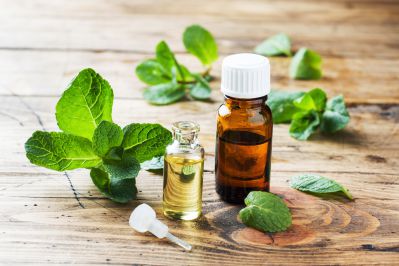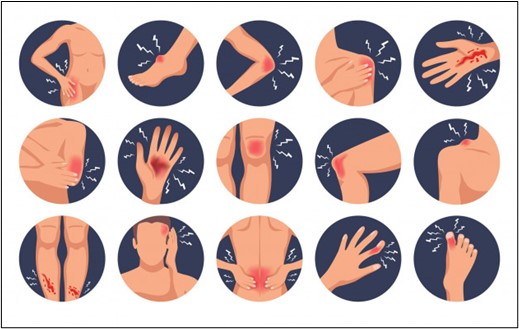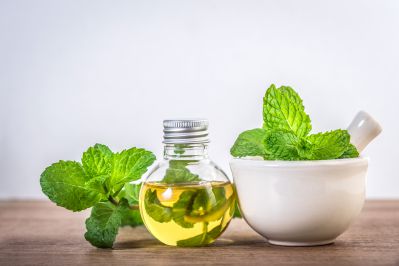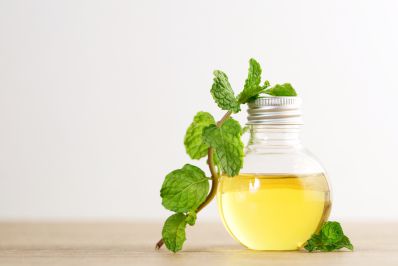Peppermint is a very common herb of Europe and America with great health importance and its oil is known as peppermint oil (an important essential oil). It has been traditionally used for health and beauty.
Some important facts about peppermint oil that should be known
- Peppermint oil is an essential oil, generally liquid in room temperature
- It is mainly pale yellow-greenish in color
- It has a strong peppermint odor (aeromatic)
- Generally, it has pungent taste
- It is slightly soluble in water but completely soluble in alcohol
- Heating the oil at high temperature causes decomposition and produces irritating fumes and smokes
Nutritional composition
- It contains mainly fats and too some extent of carbohydrates and proteins as macronutrient
- It also contains various micronutrients like Vitamin A, Vitamin C, calcium, phosphorus, potassium, iron, magnesium
- It contains various secondary metabolites such as menthol, menthyl acetate, limonene, beta-caryophyllene, menthone, 1,8-cineole, beta-pinene, carvone, menthofuran, isopulegol, isomenthone, pulegone
- Menthol is considered as the primary constituent of peppermint oil, which is responsible for providing anti-spasmolytic activities
Properties of peppermint oil
Cardiovascular property
- Peppermint oil has vasodilating property. It helps to reduce blood pressure by vasodilation and it has been traditionally used as an effective rubefacient
- It also helps to reduce increased heart rate
- It is associated with relaxing the bronchial smooth muscle and helps to enhance ventilation that promotes effective circulation of oxygenated blood within body

Analgesic property
- Peppermint oil acts as strong analgesic and coolant especially for skin
- It has seen that cold receptors present on skin are well stimulated by peppermint oil and it also helps to dilate blood vessels, both of which are responsible for exerting a cooling effect
- Application of peppermint oil on skin helps to increase skin temperature, muscle temperature and cutaneous blood flow that are also responsible for exerting analgesic and cooling effect

Antioxidant property
- It has strong antioxidant activity that helps to prevent oxidative damages of body by reducing the concentration of free radicals and helps to reduce the susceptibility of cancers
- It also exerts strong anti-inflammatory activity that helps to prevent inflammation and pain
Antimicrobial property
- It helps to prevent the growth and reproduction of bacteria, virus and fungus within host
- It has seen that aqueous extraction of peppermint oil helps to inhibit the growth of both gram positive and gram-negative bacteria
- It exerts bacteriostatic effects mainly against Lactobacillus bulgaricus and Streptococcus thermophilus by interfering with microbial cellular metabolism, DNA replication and protein synthesis

Pulmonary property
- It has seen that inhalation of peppermint oil enhances the force of nasal air, which helps to enhance the air supply within lungs
- It helps to enhance lungs function by making the lung surfactant efficient
- It also helps to enhance inspiratory muscle strength
Immunological property
- It helps to improve immunological responses of body as well as helps to protect the body from contaminations
- It also helps to prevent allergies especially antigen induced allergies in body
Health benefits
Role on preventing IBS (irritable bowel syndrome)
- Irritable bowel syndrome is a chronic disease of large intestine, characterized by alternative diarrhea and constipation along with severe stomach pain and flatulence. It is a severe complication and if not treated, it may develop severe disorders of digestive tract. Peppermint oil helps to improve the symptoms of IBS
- It has seen that it helps to relax the smooth muscle of gastrointestinal tract that helps to reduce IBS
- Anti-inflammatory activity of peppermint oil also helps to prevent IBS
Role on preventing other gastrointestinal diseases

- It helps to improve bile flow and helps to calm the stomach muscle, which help to prevent indigestion
- It has carminative property, which is associated with expelling gas from stomach or intestine, hence helps to prevent flatulence and promotes digestion
- It also helps to prevent several gastrointestinal complications like, nausea, vomiting, diarrhea, stomach upset and abdominal pain
- Inhalation of peppermint oil is associated with reducing appetite as it helps to exert a feeling of fullness
- It has significant role on preventing non obstructive dyspepsia
Role on mental health
- Peppermint oil acts as an effective stimulant for nervous system and is related with improving cognitive abilities
- It has seen that inhalation of peppermint oil is associated with improving memory, attention, problem solving abilities, reasoning and the ability of performing mental tasks
- It also helps to exert a cooling effect and has a refreshing activity that lead to prevent anxiety, depression and stress, which is closely related with improving mental health
- It has strong sedative activities that helps to prevent insomnia and promotes healthy sleeping that is also associated with improving mental status
Role on muscle
- It is accountable for exerting cooling and relaxing effects on muscle that helps to prevent muscle pain and fatigue and improves muscle functionality
- It also has potent antispasmodic activities that helps to reduce excessive contractility of smooth muscles and reduces muscle cramping

Role on preventing pain
- The anti-inflammatory activities and analgesic activities of peppermint oil help to relief pain
- Menthol component of peppermint oil exerts a cooling effect on sore and hence helps to prevent achy muscle and muscle soreness
- It also helps to prevent headache as well as the severe pain of migraine
- It shows significant effect on reducing menstrual cramp

Role on preventing congestion and cold
- It has seen that inhalation of the vapor of peppermint oil plays significant role on preventing normal cold and cough
- Menthol of peppermint oil is responsible for affecting the mucus receptor of nose that helps to open the airway and helps to clear the mucus
- It has seen that application of peppermint oil (2 or 3 drops) on chest helps to clear lung congestion
- It also helps to prevent sinus congestion by inhibiting the growth of bacteria responsible for the respective congestion
Role on dental health
- Anti-inflammatory and antimicrobial activities of peppermint oil help to protect teeth from bacterial infestation by inhibiting their growth
- It helps to prevent several teeth and gum diseases like, carries, dental plaque formation and gum infections
- It also helps to freshen the breath as well as helps to keep away bad oral odour

Usages of peppermint oil
- It can be used for preventing allergies
- It can be used as an effective energy booster as it is associated with improving blood circulation
- It can be applied on lower abdomen and massaging over there helps to prevent constipation
- It can be used as a fever reducing therapeutic agent
- It can be used as an effective cleaning agent due to its antimicrobial activities
- It can also be used for synthesizing cream or ointment for applying on inflamed area for relieving pain
- It can be used for preparing mouth fresheners
- It can also be used for preparing soap
Risk factors
Excessive usage of peppermint oil is not healthy as it may develop several health complications like allergic reaction, heart burn, diarrhea, burning mouth syndrome, renal complications, mouth ulcer, skin irritation, headache and difficulty in breathing

Source:
CHIS, M.S., MUSTE, S., PAUCEAN, A., MAN, S., POP, A., POP, C.R. and MARTIS, G.S., 2019. A COMPREHENSIVE REVIEW OF MEDICINAL AND THERAPEUTIC USES OF MENTHA PIPERITA. Hop and Medicinal Plants, 27(1-2), pp.38-49.
Coutinho, J. and Selfridge, N., 2019. Peppermint Oil for IBS?. Integrative Medicine Alert, 22(12).
Kehili, S., Boukhatem, M.N., Belkadi, A., Ferhat, M.A. and Setzer, W.N., 2020. Peppermint (Mentha piperita L.) essential oil as a potent anti-inflammatory, wound healing and anti-nociceptive drug. European Journal of Biological Research, 10(2), pp.132-149.
Lee, M.K., Lim, S., Song, J.A., Kim, M.E. and Hur, M.H., 2017. The effects of aromatherapy essential oil inhalation on stress, sleep quality and immunity in healthy adults: Randomized controlled trial. European Journal of Integrative Medicine, 12, pp.79-86.
Loolaie, M., Moasefi, N., Rasouli, H. and Adibi, H., 2017. Peppermint and its functionality: A review. Arch. Clin. Microbiol, 8(4), p.54.
Malekmohammad, K., Rafieian-Kopaei, M., Sardari, S. and Sewell, R.D., 2019. Toxicological effects of Mentha x piperita (peppermint): a review. Toxin Reviews, pp.1-15.
Nayak, P., Kumar, T., Gupta, A.K. and Joshi, N.U., 2020. Peppermint a medicinal herb and treasure of health: A review. Journal of Pharmacognosy and Phytochemistry, 9(3), pp.1519-1528.
Wu, Z., Tan, B., Liu, Y., Dunn, J., Martorell Guerola, P., Tortajada, M., Cao, Z. and Ji, P., 2019. Chemical Composition and Antioxidant Properties of Essential Oils from Peppermint, Native Spearmint and Scotch Spearmint. Molecules, 24(15), p.2825.


